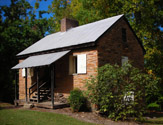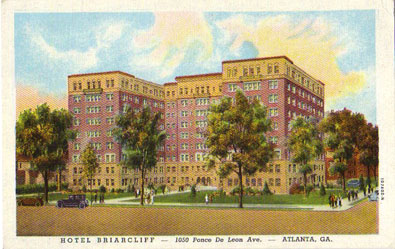















Cotton States Archive
Atlanta's Briarcliff Hotel
A Part of Ponce de Leon Avenue's Comeback?
A Part of Ponce de Leon Avenue's Comeback?
Located at the corner of Ponce de Leon and North Highland avenues in Atlanta, the Briarcliff Hotel, a luxury apartment building when it opened as "the 750" in 1925, was built for Asa G. Candler Jr. (1880-1953), the son of Coca Cola magnate and former Atlanta mayor Asa Candler Sr. (1851-1929). The Candler family's real estate firm was headquartered at the Briarcliff, and Candler Jr. maintained a nine-room penthouse suite on the top floor of the building until his death. Gangster Al Capone (1899-1947) is said to have maintained a suite at the hotel as well.
The Briarcliff was situated at the entrance to Druid Hills, a residential district noted for its distinguished homes, beautiful parks and affluent residents. Landscape architect and community planner Frederick Law Olmsted (1822-1903), who designed New York's Central Park and George Vanderbilt's vast Biltmore Estate near Asheville, North Carolina, planned the Druid Hills neighborhood just prior to his death.
The H-shaped, nine story Briarcliff was designed by prominent Atlanta architect G. Lloyd Preacher (1882-1972), the man responsible for designing downtown Atlanta's Henry Grady Hotel (1924) and city hall (1930) as well as Augusta's Imperial Theatre (1918) and Birmingham's Redmont Hotel (1925). Preacher's residential projects included his own Druid Hills residence (1924) and Rainbow Terrace (1921-1922), the Mediterannean-style villa he built for Lucy Candler Heinz, Candler Jr.'s sister.
The Briarcliff was situated at the entrance to Druid Hills, a residential district noted for its distinguished homes, beautiful parks and affluent residents. Landscape architect and community planner Frederick Law Olmsted (1822-1903), who designed New York's Central Park and George Vanderbilt's vast Biltmore Estate near Asheville, North Carolina, planned the Druid Hills neighborhood just prior to his death.
The H-shaped, nine story Briarcliff was designed by prominent Atlanta architect G. Lloyd Preacher (1882-1972), the man responsible for designing downtown Atlanta's Henry Grady Hotel (1924) and city hall (1930) as well as Augusta's Imperial Theatre (1918) and Birmingham's Redmont Hotel (1925). Preacher's residential projects included his own Druid Hills residence (1924) and Rainbow Terrace (1921-1922), the Mediterannean-style villa he built for Lucy Candler Heinz, Candler Jr.'s sister.
Aesthetically appealing with its 2-story concrete cast-in-place base, red brick shaft and stuccoed top floor with wonderful terra cotta detailing, the Briarcliff originally comprised 200 apartment units, but was converted into 400 rooms when its use as a commercial hotel warranted offering more affordable rates due to hard economic times.
"Get On the Happy Side of Living"
Asa Candler Jr. wasn't the only prominent Atlantan to base a business enterprise at the Briarcliff. Gospel music pioneer Hovie Lister and his Statesmen Quartet also wound up maintaining offices at the hotel. Lister and his wife, Ethel, even resided at the Briarcliff for a number of years before relocating to a condominium in Decatur.
"Get On the Happy Side of Living"
Asa Candler Jr. wasn't the only prominent Atlantan to base a business enterprise at the Briarcliff. Gospel music pioneer Hovie Lister and his Statesmen Quartet also wound up maintaining offices at the hotel. Lister and his wife, Ethel, even resided at the Briarcliff for a number of years before relocating to a condominium in Decatur.

A luxury apartment building when it opened as "the 750" in 1925, many hope the former Briarcliff Hotel regains its original luster. Currently a federally subsidized apartment building, some would like to see the landmark converted into loft apartments.
Atlanta native Don Butler, a charter member of the Gospel Music Association and the organization's first executive director, had worked in Dallas as the business manager and copyright administrator for the Stamps and Blackwood Brothers quartets and their respective music publishing companies prior to returning to his hometown in 1965. He was eventually hired to be the business administrator for the Statesmen.
Butler, an original member of gospel's legendary Sons of Song and a formidable vocalist in his own right, even filled vacancies in the quartet whenever needed. "I was always there to sing with the Statesmen---lead or baritone---at any time when somebody was not there to fill their spot. And the last time I sang with them was for six or eight months in 1968 when they celebrated their 20th anniversary. We celebrated the 20th anniversary of the Statesmen, and I was singing with the quartet and managing the four publishing companies they owned," Butler recounts. The publishing interests, all based at the Briarcliff Hotel, included Faith Music, Inc., J. M. Henson Music Company, Inc., Abernathy Publishing Company and V. B. (Vep) Ellis with catalogues containing such favorites as "Sorry, I Never Knew You," "I'll Live in Glory," "This Great Caravan Keeps on Rolling Along," "Do You Know My Jesus?," "Is My Lord Satisfied with Me?" and "Get On the Happy Side of Living."
Fit for a King!
During his years of employment with the Statesmen, Don Butler and Statesmen tenor Roland "Rosie" Rozell also partnered to open the King & Prince Restaurant, a popular dining establishment inside the Briarcliff Hotel.
"It was an upscale restaurant," Butler recalls, "and on Sundays we had what you called back then a smorgasbord." Butler adds, "We had a chef who presided over a beautiful buffet, carving a standing rib roast of beef. And, ironically, there were churches on every side of the hotel. One of the most famous churches in Atlanta was Druid Hills Baptist Church---where Hovie Lister was a deacon and where they had his funeral services---and they started letting out fifteen minutes earlier so their congregation could get over to our restaurant to eat because we had such a big crowd on Sundays." Butler says the restaurant was such a hit that people in the community "would bring their own plates, their own china, from home and get their food and take it back home."
As for its bill of fare, Butler says the restaurant was noted for its variety of dishes, and he remarks, "I borrowed some things from out in California that I had picked up on out there and put 'em on the menu and featured them. And people just liked it."
Eventually, the partnership between Butler and Rozell dissolved, and Butler moved to Nashville in November 1972 where he became president of a prominent talent agency.
Briarcliff Summit Faces Uncertain Future
Today, the former Briarcliff Hotel is now the Briarcliff Summit, a federally subsidized apartment building occupied by the elderly. In April 2006, Atlanta's alternative newsweekly Creative Loafing reported of the Briarcliff's current state and its owner's decision to place the historic building on the market.
During the past few decades the area had become a haven for drug dealers and prostitutes, and apparently the building's stairwells and corridors are frequented by the homeless and drug pushers. Police have been called to the building on numerous occasions regarding complaints ranging from theft to sexual assault. Residents have alleged that the property owners are guaranteed income from federal vouchers and are not inclined to adequately address security or maintenance issues. While Brencor, Inc., the building's management company, maintains it adheres to federal guidelines, Creative Loafing journalist Coley Ward reported in 2006 that the Briarcliff Summit "has been written up by the city for having inoperable 'call for aid' boxes and failing to fix rooms with no heat, no water and deteriorating carpet, among other violations of city code."
Nonetheless, Ponce de Leon Avenue has been making a comeback, and the Briarcliff Summit's owners are hoping to sell, further contributing to the uncertain future of the building's low-income tenants. Conversion to loft apartments is the likely fate of the building if it manages to avoid the wrecking ball altogether. Though listed on the National Register of Historic Places in 1982, the Briarcliff remains subject to demolition because it has never been designated a local landmark.
Butler, an original member of gospel's legendary Sons of Song and a formidable vocalist in his own right, even filled vacancies in the quartet whenever needed. "I was always there to sing with the Statesmen---lead or baritone---at any time when somebody was not there to fill their spot. And the last time I sang with them was for six or eight months in 1968 when they celebrated their 20th anniversary. We celebrated the 20th anniversary of the Statesmen, and I was singing with the quartet and managing the four publishing companies they owned," Butler recounts. The publishing interests, all based at the Briarcliff Hotel, included Faith Music, Inc., J. M. Henson Music Company, Inc., Abernathy Publishing Company and V. B. (Vep) Ellis with catalogues containing such favorites as "Sorry, I Never Knew You," "I'll Live in Glory," "This Great Caravan Keeps on Rolling Along," "Do You Know My Jesus?," "Is My Lord Satisfied with Me?" and "Get On the Happy Side of Living."
Fit for a King!
During his years of employment with the Statesmen, Don Butler and Statesmen tenor Roland "Rosie" Rozell also partnered to open the King & Prince Restaurant, a popular dining establishment inside the Briarcliff Hotel.
"It was an upscale restaurant," Butler recalls, "and on Sundays we had what you called back then a smorgasbord." Butler adds, "We had a chef who presided over a beautiful buffet, carving a standing rib roast of beef. And, ironically, there were churches on every side of the hotel. One of the most famous churches in Atlanta was Druid Hills Baptist Church---where Hovie Lister was a deacon and where they had his funeral services---and they started letting out fifteen minutes earlier so their congregation could get over to our restaurant to eat because we had such a big crowd on Sundays." Butler says the restaurant was such a hit that people in the community "would bring their own plates, their own china, from home and get their food and take it back home."
As for its bill of fare, Butler says the restaurant was noted for its variety of dishes, and he remarks, "I borrowed some things from out in California that I had picked up on out there and put 'em on the menu and featured them. And people just liked it."
Eventually, the partnership between Butler and Rozell dissolved, and Butler moved to Nashville in November 1972 where he became president of a prominent talent agency.
Briarcliff Summit Faces Uncertain Future
Today, the former Briarcliff Hotel is now the Briarcliff Summit, a federally subsidized apartment building occupied by the elderly. In April 2006, Atlanta's alternative newsweekly Creative Loafing reported of the Briarcliff's current state and its owner's decision to place the historic building on the market.
During the past few decades the area had become a haven for drug dealers and prostitutes, and apparently the building's stairwells and corridors are frequented by the homeless and drug pushers. Police have been called to the building on numerous occasions regarding complaints ranging from theft to sexual assault. Residents have alleged that the property owners are guaranteed income from federal vouchers and are not inclined to adequately address security or maintenance issues. While Brencor, Inc., the building's management company, maintains it adheres to federal guidelines, Creative Loafing journalist Coley Ward reported in 2006 that the Briarcliff Summit "has been written up by the city for having inoperable 'call for aid' boxes and failing to fix rooms with no heat, no water and deteriorating carpet, among other violations of city code."
Nonetheless, Ponce de Leon Avenue has been making a comeback, and the Briarcliff Summit's owners are hoping to sell, further contributing to the uncertain future of the building's low-income tenants. Conversion to loft apartments is the likely fate of the building if it manages to avoid the wrecking ball altogether. Though listed on the National Register of Historic Places in 1982, the Briarcliff remains subject to demolition because it has never been designated a local landmark.
BIBLIOGRAPHY
Robert Michael Craig, Atlanta Architecture: Art Deco to Modern Classic, 1929-1959 (Gretna, Louisiana: Pelican Publishing Company, Inc., 1995).
Isabelle Gournay, AIA Guide to the Architecture of Atlanta (Athens: University of Georgia Press, 1992).
Coley Ward, "Ponce Gem May Be Restored," Creative Loafing (Atlanta), April 19, 2006.
"G. Lloyd Preacher (1882-1972)," New Georgia Encyclopedia. Retrieved August 26, 2009: http://www.newgeorgiaencyclopedia.org
"Late Victorian Architecture: Overview," New Georgia Encyclopedia. Retrieved August 26, 2009: http://www.newgeorgiaencyclopedia.org
OTHER SOURCES
Telephone conversation with Don Butler, Brentwood, Tennessee on June 15, 2009
Robert Michael Craig, Atlanta Architecture: Art Deco to Modern Classic, 1929-1959 (Gretna, Louisiana: Pelican Publishing Company, Inc., 1995).
Isabelle Gournay, AIA Guide to the Architecture of Atlanta (Athens: University of Georgia Press, 1992).
Coley Ward, "Ponce Gem May Be Restored," Creative Loafing (Atlanta), April 19, 2006.
"G. Lloyd Preacher (1882-1972)," New Georgia Encyclopedia. Retrieved August 26, 2009: http://www.newgeorgiaencyclopedia.org
"Late Victorian Architecture: Overview," New Georgia Encyclopedia. Retrieved August 26, 2009: http://www.newgeorgiaencyclopedia.org
OTHER SOURCES
Telephone conversation with Don Butler, Brentwood, Tennessee on June 15, 2009
Author: Greg Freeman. Published August 27, 2009.
Copyright
Southern Edition
All Rights Reserved
Southern Edition
All Rights Reserved
All materials contained on this site, including text and images, are protected by copyright laws and may not be reproduced without prior written permission from the publisher. Where applicable, use of some items contained on this site may require permission from other copyright owners.
Fair Use of text from SouthernEdition.com is permitted to the extent allowed by copyright law. Proper citation is requested. Please use this guide when citing a Southern Edition article.
Contact Greg Freeman or SouthernEdition.comFair Use of text from SouthernEdition.com is permitted to the extent allowed by copyright law. Proper citation is requested. Please use this guide when citing a Southern Edition article.